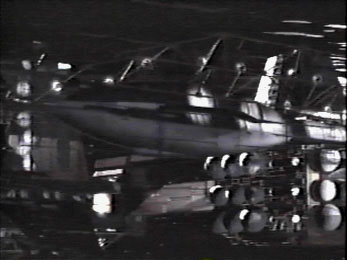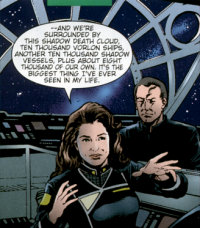|
INDUSTRIAL
CAPACITY

Industrial capacity of
the races of Babylon 5 very greatly but it has been clearly shown
that the Earth Alliance and Narn Regime, two races lacking both
gravity and teleportation technology were able to construct massive
fleets in the course of only a hundred years. In this document we
will take a look at the Industrial strength of the races of Babylon
5, specifically the Earth Alliance, to better understand the scope
and cost associated with the space fairing empires of the Babylon
universe.
Earth Alliance was founded
in 2075* and between it's founding
and 2150 Earth succeeded in establishing colonies on the Moon, Mars,
the Sol asteroid field and the Jupiter moons of Ganymede and Europa.*
In 2156 the Centauri
Republic made official contact with the Earth Alliance and, via
this encounter, Earth was able to leap ahead 200 years in technological
development.* Between the years of
2156 and 2245 Earth Alliance establishes it's self as a galactic
super-power with a fleet of some 50,000 starship.*
At what point Earth
began issuing the official hull registry numbers, as seen on Earthforce
vessels, in unclear. Earth Alliance did not become a true political
body until 2122*, and the military
branch of Earth Alliance - Earthforce - was not formed until some
time between 2122 and 2145. In addition, Earthforce was originally
only an Alliance sanctioned police force and not a true military
organization.
According to the "Earthforce
Source Book" the Earth Alliance fleet was not formed until after
Earth Alliance purchased jump technology from the Centauri and there
were few space vessels in it's service until after this time, as
stated in the EFSB:
When Earthforce
was founded as a peacekeeping militia, the majority of its
members were deployed in countries or on colonies to control
terrorist aggression on the ground.
Earthforce Source Book - pg. 6. |
Statements
in the EFSB also stated that it took some twenty years for Earthforce
to produce any kind of viable space fleet, after making first
contact with the Centauri in 2156. With limited ships and almost
no fighters, Earthforce lost it's first engagement with an alien
power in April of 2169**,
when a neighboring race known as the Koulani attacked the Earth
Alliance outpost in Signet.
One year after the defeat
at Signet another race, the Ch'lonas, attacked Leonis IV, but their
attack was repelled by one of Earthforce's new carrier, the EAS
Avenger. Text in the EFSB state clearly that Earth Alliance's first
priority in those early days of the fleet were not capital ships,
bur rather fighters and it wasn't until the Starfury's debut in
2170 that the fleet began to take shape:
With the addition
of the Starfury in its forces, the EA fleet began to grow
rapidly.
Earthforce Source Book - pg. 7. |
Given
these facts, it is most likely that the hull registry numbers
for Earthforce capital ships came into play primarily after the
year 2170 and as such we will use this year when we gage the average
growth rate of the Earth Alliance fleet. Thus, to establish a
rough view with which to gage Earth Alliance's industrial capacity,
we will take the average fleet production from between the years
2170 and 2245 - a period of 75 years.
Statements from the
EFSB as well as comments by JMS and B5 literature suggest that,
between 2200 and 2230 Earth Alliance had constructed a fleet rivaling
the Centauri Republics; at this time Earth Alliance consisted of
14 colonies and seven outposts. In the year 2231 Earth Alliance's
fleet strength was put to the test when Earth Alliance joined the
League of Non-Aligned Worlds in their war against the invading Dilgar
Empire.
As the primary warship
of this time was the Hyperion class Heavy Cruiser, believed by some
to have been named after the first ship in her class, EAS Hyperion
hull registry number 21,494-IAK. To date, the meaning of the letters
in the registration number are not known, some suggesting they denote
the fleet yards where the ship was built. Still, the numbers themselves
speak volumes and clearly indicate that between 2170 and 2230 Earth
Alliance had constructed at least 22,000 starships. This would indicate
that, at minimal, Earthforce was capable of construction an average
of 365 starships every year.
By the Earth Minbari
War, construction of Hyperion class vessels was still high as seen
by the debut of the Prometheus, which had a hull registration of
38,567-HHD. This suggests that between 2231 and 2245 the Earth fleet
had grown by approximately 17,000 starships or 1200 ships built
a year. This is unlikely however, it being more likely earth had
30,000 capital ships back in 2230, which would mean that the average
ship construction time would have been more like 400 capital ships
per year, which would be more consistent with the 8,000 ship growth
rate seen between 2230 and 2245.
During the last battle
of the Earth/Minbari war a fleet of 2,000 ships held the line against
the Minbari Advanced. Bulk of these forces consisted of fighters
and small starships, as well as several capital ships. Among these
ships was a Hyperion class Heavy Cruiser with a hull registry number
beginning in 48, i.e. 48,000 series. This suggests a fleet growth
rate between 2245 and 2248 was some 10,000 vessels or 3,300 ships
per year with all Earth Alliance's resources dedicated to the war
effort. If this it to be believed, than it would clearly illustrate
that Earth had a massive industrial base and supports the 50,000
starship figure asserted in the novelization of the B5 movie "In
the Beginning."
Unfortunately the idea
that Earth Alliance could construct 10,000 ships in three years
is too outrageous a notion for one to swallow, unless the bulk of
those ships were small patrol boats or gunships. This is, of course,
possible but it is more likely that the aforementioned instances
used to gage ship growth (registry numbers on the Hyperion and Prometheus),
were flawed given that we do not know for sure exactly how many
ships were in the service of the Earth Alliance in the previously
stated time periods.
Still, despite the problems
narrowing down the growth rate of the Earthforce fleet, the approximate
total ship output between 2170 and 2248 does appear to be no less
than 48,000 vessels of capital scale, suggesting an industrial capacity
capable of supporting the construction of approximately 640 starships
per year.
Not all of Earth Alliance's
fleet however would consist of the massive Omega, Nova or Hyperion
type vessels. Indeed, the bulk of Earthforce's fleet most likely
consists of support vessels and medium/small scale capital ships.
Using the United States navy as a basis for comparison, we can estimate
the size of the Earthforce fleet and the average number of ships
in a given scale type.
As of April 2000 the
United States Navy had a fleet of 315 capital ships and 4,108 aircraft.
Of the capital ships, some 20% qualify are large-scale capital ships
similar in role to the Omega, Nova and Hyperion. 30% appear to fall
into the Medium scale range, which would include Earthforce Cruiser
and Frigates. Nearly 17% of the Earthforce fleet would include small
ships such as Corvettes, gunships and border patrol vessels while
another 33% would consist of support vessels. Note that these are
approximations given that many ships in the U.S. Navy do not perform
roles that would fit a one-to-one comparison with the ships of Babylon
5. Still, it does give as a rough approximation we can use to break
down the E.A. fleet.
First of all, we must
determine the size of the fleet. Of the Total 50,000 ships constructed
in Earthforce's first 78 years, 10,000 would have qualified as heavy
warships like the Nova or Hyperions'. 15,000 ships would have fallen
into the medium scale range. 16,500 of E.A.'s total fleet strength
would have consisted of small vessels like Corvettes and gunships
and another 8,500 ships would have fallen into the support role.
In addition, Earthforce would have 650,000 aircraft deployed including
fighters and shuttles.
If fleet construction
mirrors the size and distribution of the fleet, then of the ships
constructed by Earth Alliance every year, 20% of those ships put
into service would be large-scale warships. Thus, of the approximate
615 ships constructed annually, 123 of those ships would be of a
scale ranging between 1,200 and 2,000 meters.
6 large ships 20%
9 medium ships 30%
10 small ships 33.3%
5 support ships 16.6%
It is also interesting
to note the numerical difference of fighters in the US Navy to capital
ships. In the Season Two episode of Babylon 5 titled "The Fall of
Night", we clearly saw the Starfury registration number of Warren
Keffer's fighter, via the rescued gun-camera footage salvaged by
ISN.
Keffer's Starfury number
was 4308911. If we assume that, in Earthforce's history 70% of all
fighters had been destroyed or decommissioned, then Earthforce would
have had a total of 61,555. If we adjust the proportion number of
Earth fighters to that of US Naval fighters relative to capital
ships, then Earthforce would have a fleet of approximately 4,720
capital scale ships. Of course, the statistics for the US Navy represents
ships in active service, not the size of the entire US Naval fleet.
 The
biggest battle scene in Babylon 5, was the battle waged between
the Shadows and Vorlosn in the episode "Into the Fire."
In the comic book "In Valen's Name", written by JMS, we
read quite clearly in the opening page, that the Vorlons and Shadows
had both arived on the scene with their planet killers, supported
each by over 10,000 capital ships. Ivanova goes on to state that
the Army of Light had about 8,000 warships on the scene. Given that
it is unlikely that Ivanova would include fighters with fleet size,
the League worlds, Whitestard, part of the Minbari's fleet and one
Narn Heavy Cruiser made up the total 8,000 ships scene during the
battle. The
biggest battle scene in Babylon 5, was the battle waged between
the Shadows and Vorlosn in the episode "Into the Fire."
In the comic book "In Valen's Name", written by JMS, we
read quite clearly in the opening page, that the Vorlons and Shadows
had both arived on the scene with their planet killers, supported
each by over 10,000 capital ships. Ivanova goes on to state that
the Army of Light had about 8,000 warships on the scene. Given that
it is unlikely that Ivanova would include fighters with fleet size,
the League worlds, Whitestard, part of the Minbari's fleet and one
Narn Heavy Cruiser made up the total 8,000 ships scene during the
battle.
It should also be noted
that, given Ivanova's statement, she was talking about the part
of the battle where the Shadow cloud had surrounded the entire fleet,
Vorlon and the Army of Light. Thus the figure of 28,000 being present
would be those ships that had survived the battle up to that point,
suggesting that the fleet sizes were even greater at the beginning
of the battle.
*(Founding
date stated in "The Babylon Project" RPG. Data from B5 Security
Manual and the B5 official time-line support this figure).
*(Exploration
as stated in all available B5 resources, including the original
B5 Writer's Bible).
*(Stated
several times by JMS in postings, as well as published in B5 novels,
B5 Security Manual and RPG's.)
*(Figure
suggested by Earth hull registry numbers and comments found in B5
novels and B5 related printed media.)
*(Earthforce
Source Book.)
**(Earthforce
Source Book.)
|
![]()